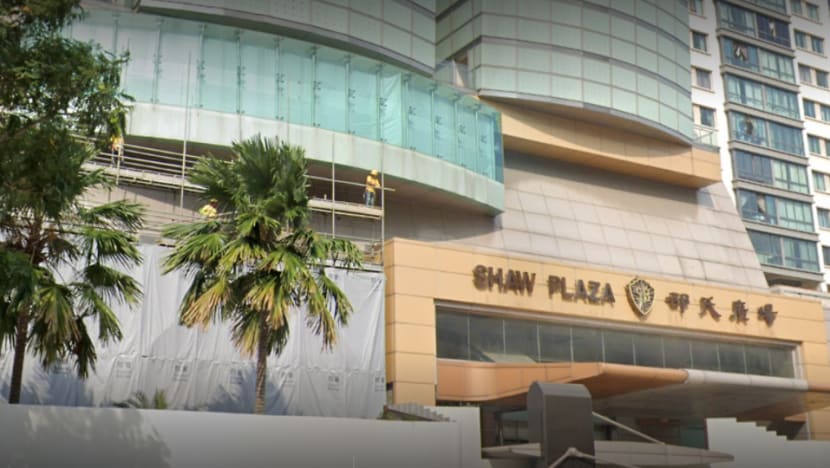Foreign worker fell 4.7m through board to his death, MOM considering action: Coroner

Screengrab from Google Street View of Shaw Plaza in November 2019.
SINGAPORE: A foreign worker who had been working in Singapore for more than 10 years stepped through a board at a work site, falling 4.7m into the basement at Shaw Plaza and later dying of his injuries.
A coroner on Thursday (Dec 3) ruled the death of 30-year-old Indian national Ramakrishnan Ravichandran an unfortunate workplace accident, noting that the Ministry of Manpower (MOM) is considering taking action against the deceased's company and the occupier of the building on Balestier Road.
Mr Ravichandran had been clearing dismantled electrical fixtures in the building on Nov 14 last year as part of his work with several other workers when he stepped through a gypsum board covering the sides of an escalator pit.
Before this, workers had been throwing debris and dismantled electrical wiring from the second floor of the building into the pit on the first floor.
The gypsum board, or drywall, was not meant to hold a person's weight, said Coroner Prem Raj. It was also covered with concrete dust from other works and could not be distinguished from the concrete beams or other fixtures.
Mr Ravichandran fell 4.7m and landed on the floor of the basement. He was later taken to hospital but resuscitation efforts failed, after he suffered cardiac arrests, and he was pronounced dead that morning.
An autopsy found that he had died from multiple injuries including fractures of the skull, ribs and sternum, or chest bone.
The court heard that a safety briefing had been held that morning by the safety supervisor employed by Express 21, including a reminder not to go to unsafe areas and to wear equipment such as helmets at all times.
Mr Ravichandran was assigned along with two other men to do housekeeping works, clearing and cutting electrical wire and removing electrical trunking.
They tossed the debris from the second floor into the escalator pit at the first floor, and later went into the pit to clear the items.
While work was ongoing, one of the workers who was in the pit clearing the debris heard "a loud noise like a wooden plank breaking". He looked up and saw a hole in the pit and alerted the rest that Mr Ravichandran had fallen down.
They went to the basement and saw Mr Ravichandran's motionless body lying face-down on the ground. He was later taken to hospital unresponsive and without a pulse, and was pronounced dead later that morning.
The High Commission of India and the Ministry of Foreign Affairs were notified of the demise later that day, and MOM conducted investigations.
The probe revealed that the pit at Level 1 had previously housed the escalator and its motor, but these were removed in late October 2019. To prevent workers from falling into the pit, the building occupier had barricades installed, but an unidentified person later removed the front barricade and replaced it with just netting.
Mr Ravichandran had probably removed the netting to gain access into the pit to remove electrical fixtures, said the coroner.
Four gypsum boards - which are used as partitions and linings of walls and the like, but are unable to withstand a person's weight - covered a void at the right of the pit. The boards were separated from the pit by a concrete beam.
However, because of previous hacking and demolition near the pit, the area was covered in a layer of concrete dust such that the concrete beam and the boards appeared the same.
When Mr Ravichandran stepped on one of the boards at the side of the pit, it broke and landed on the basement floor in six pieces that were found along with his helmet.
REVIEW FINDINGS
A review of his working hours in the three months before his demise did not find that he worked excessive hours, and he appeared normal during the meeting before the works began, ruling out work fatigue as contributing to the fall.
A review found that no one knew about the presence of the boards and the dangers they posed, and no safe work practices had been established by Express 21 for housekeeping works.
MOM found that such fragile surfaces are commonly found in such work sites and falling through them is considered a foreseeable risk.
The ministry is currently considering taking action against Express 21 and the building occupier under the Workplace Safety and Health Act.
The coroner reiterated two points made by the Workplace Safety and Heath Council in an accident bulletin issued after Mr Ravichandran's demise.
Floor openings should be securely covered whenever possible by concrete slabs or metal gratings. If it is unavoidable to use fragile surfaces like gypsum boards, the areas should be marked with clear signs and demarcated to prevent workers from entering the hazard zone and stepping on any of the surfaces.
The coroner added that there should be proper communication prior to starting work, in the form of a pre-work briefing highlighting site hazards and how to carry out work safely.
He extended his deepest condolences to Mr Ravichandran's family, who could not attend the hearing, for their very tragic loss.














